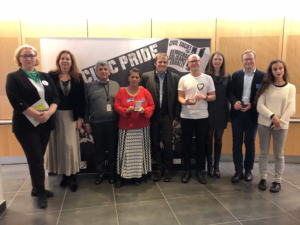With #CivicPride, we ended a very intense year of campaigning all across Europe, a year full of actions advocating for a democracy that gives voice to everyone, leaves no one behind and makes Europe great for all!
More than a thousand organisations and activists took the social networks between 5 and 10 December to express their pride for working in solidarity for rights and democracy for all. To say hands off human rights, open civic space, support to democracy and civic participation! To say NO to the criminalisation of civic activism and YES to social solidarity! To defend and reclaim the freedom of association, assembly and expression!
We gave a powerful and symbolic echo to this mobilisation in Brussels on 4-5 December, bringing activists and academics in the European Economic and Social Committee and the European Parliament to engage in a meaningful conversation with key institutional representatives about the role civil society can play to revive support for European values and trust in democratic institutions.
As ECF President, Jean-Marc Roirant, said “In order to achieve a more democratic and socially just society, at a time when politics of division is gaining ground throughout Europe, democratic civil society is a barricade against barbarism.”
And this statement is perfectly illustrated within Activizenship #4 – Stories of Resistance, the Civic Space Watch Report 2019 that we launched on this occasion. Our host in the European Parliament, Pietro Bartolo said that: “We need to encourage citizens and CSOs participation right from here, from the rooms of the European Parliament!” Heidi Hautala, EP Vice-President, stated in her introductory speech: “There is no democracy without living civil society.”
“As a former NGO employee who entered politics because of Orban’s attacks on civil society, it’s an honour to be invited by the European Civic Forum to discuss how the EU can protect civic space.”, said Anna Donath, Hungarian MEP. Finally, Birgit Van Hout, OHCHR Representative for Europe, rightfully asserted that “Illiberal democracy is an oxymoron. Democracy is liberal or it isn’t. Human rights can’t be fully realized without rule of law and a vibrant civil society”.
Like an echo to her words, various grassroots movements and local initiatives spoke about their ways to regain democratic spaces, and also about the pressures and challenges they face and the importance of solidarity in supporting their mobilisations. Yet, the participants in the room agreed that EU institutions are not doing enough in protecting those civic actors and securing their democratic space.
In this context, we have been very happy to witness an encouraging and most welcomed step forward made by President Von der Leyen at the beginning of December last year: she took up our demands and modified the mission letter for Vice-President Jurova by adding clear responsibilities for civil dialogue and civic space!
The main changes compared to the initial mandate assigned to Ms Jourova in September relates to our letter pledges for strengthening democracy and transparency: Now it reads: “You will also maintain an open, transparent and regular dialogue with representative associations and civil society.” On upholding Europe’s values and rights: “I want you to pay special attention to the protection of the right of peaceful assembly and the freedom of association.”
This is a historic success by Civil Society Europe, to which the European Civic Forum contributed by mobilising 200+ organisations in support of our open letter to EU leaders.
And the Conference for the Future of Europe could be an excellent opportunity to put this engagement into practice! Yet, the European Parliament missed a historic opportunity to champion the voice of civil society in this process!
On 15 January, during the plenary session, MEPs failed to adopt an amendment that would have set the basis for the implementation of European civil dialogue along art. 11 of TUE. The amendment, tabled by the Greens’ Group and strongly supported by the formal and informal European networks of associations, provided for the presence of four representatives of non-governmental actors in the plenary body of the Conference, was rejected with 375 votes against 286 votes in favour.
This vote constitutes a break with its previous positions! This breakup vote is obviously not the end of the story, but shows the need for an essential civic struggle for the democratic functioning of the European institutions and their relation with citizens and their organisations.
An extraordinary General Assembly of Civil Society Europe on 4 February will give the opportunity to discuss this with decision makers from the European Parliament: Mr Verhofstadt, Ms Bischoff, Mr Freund, Mr Rangel, and Mr Scholz. We will remind them their responsibility to include civil society in the process of the Conference for the Future of Europe.
The fight must go on!



